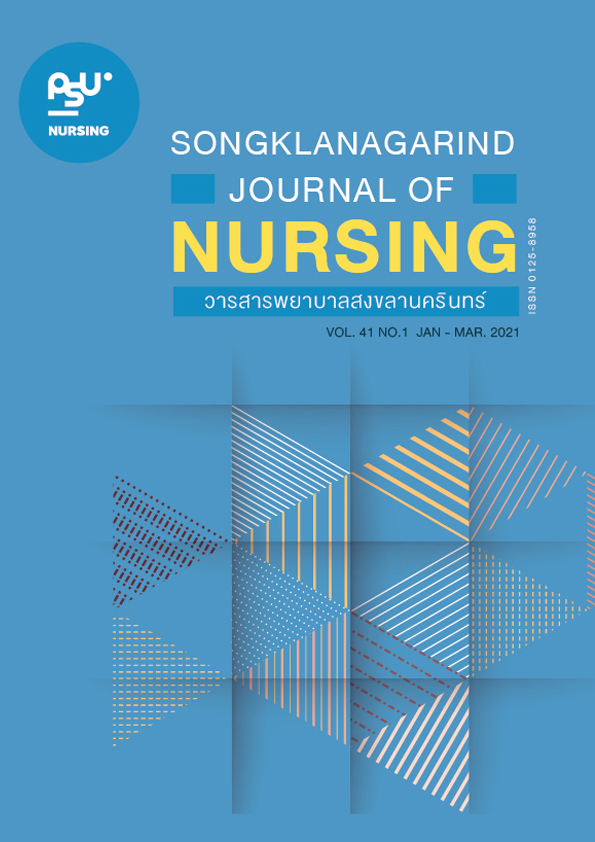Ethical Reasoning in Thai Nurse’s Practices: A Qualitative Study
Main Article Content
Abstract
This study reported on ethical reasoning application in ethical issues/dilemmas in daily nursing practices in Thailand. Ethical reasoning differences occurred as a result of individual interpretation of a subject or event, which might have a political or religious context. Ethical issues/dilemmas may potentially cause nurses to commit right and wrong actions on a daily basis because it is the duty of a nurse to protect patients by using the application of the four major principles of medical ethics: non-maleficence, beneficence, autonomy, and justice. The aim of this study was to describe the ethical reasoning nurses used in dealing with their ethical dilemmas. Information was collected using individual interviews with seven nurses experienced in ethical actions. Content analysis was used to extract significant themes. Seven themes that arose from this study were: (1) duty to provide maximum benefit to patient/family, (2) respecting patient rights, (3) freedom of the patient to make decisions, (4) respecting human dignity, (5) fairness, (6) responsibility, and (7) avoidance of putting patient/family in danger. The results of this study highlight that Thai nurses use ethical reasoning in their work practices. These results must be used to guide development and psychometric evaluations of ethical reasoning principled in nursing practice scale for Thai nurses in the future.
Article Details
References
Beauchamp TL, Childress JF. Principles of biomedical ethics. 7 th ed. New York: Oxford University Press; 2013.
Burkhardt M, Nathaniel A. Ethics and issues in contemporary nursing. 4 th ed. Burlington: Cengage Learning; 2013.
Butts JB, Rich KL. Nursing ethics: Across the curriculum and into practice. 3 rd ed. Burlington: Jones and Bartlett Learning; 2013.
Johnstone MJ. Nursing and justice as a basic human need. Nurs Philos. 2011; 12(1): 34-44. doi: 10.1111/j.1466-769X.2010.00459.x.
Andreas W, Christof B. Ethical decisionmaking in hospice care. Nurs Ethics. 2015; 22(3): 321-30. doi: 10.1177/0969733014534873.
Entwistle VA, Carter SM, Cribb A, et al. Supporting patient autonomy: The importance of clinician-patient relationships. J Gen Intern Med. 2010; 25(7): 741-5. doi: 10.1007/s11606-010-1292-2.
David MS, Sharon-Lise TN. Autonomy, beneficence, justice, and the limits of profiling. J Am Coll Cardiol. 2012; 59(25): 2383-6. doi: 10.1016/j.jacc.2011.12.050.
Pato T, Suttarungsee W, Nasae T. Nurses’ ethical dilemmas and ethical decision making in providing care for psychiatric patients with violent behavior in Psychiatric Hospitals, Southern Thailand. Songklanagarind J Nurs.
; 33(2): 1-14. Thai.
De Roubaix JAM. Beneficence, non-maleficence, distributive justice and respect for patient autonomy-reconcilable ends in aesthetic surgery?. J Plast Reconstr Aesthet Surg. 2011; 64(1): 11-6. doi: 10.1016/j.bjps.2010.03.034.
Ebru B. Ethical decision-making levels of oncology nurses. Nurs Ethics. 2018; 26(1): 1-9. doi: 10.1177/0969733018803662.
Kenny B, Lincoln M, Balandin S. Experienced speech-language pathologists’ responses to ethical dilemmas: An integrated approach to ethical reasoning. Am J Speech Lang Pathol. 2010; 19(2): 121-34. doi: 10.1044/1058-
(2009/08-0007).
Mohsen SEM, Abbas A, Masoud B. Nursing ethical values and definitions: A literature review. Iran J Nurs Midwifery Res. 2013; 18(1): 1-8.
Fry ST, Johnstone M. Ethics in nursing practice: A guide to ethical decision making. New York: Wiley-Blackwell; 2020.
Krippendorff K. Content analyses: An introduction to its methodology. Sage publications; 2018.
Gadamer H-G. Hermeneutics and social Science. Cultural Hermeneutics. 1975; 2(4): 307-16. doi: 10.1177/019145377500200402.
Chisato S, Katsumas O. Information-sharing ethical dilemmas and decision-making for public health nurses in Japan. Nurs Ethic. 2015; 22(5): 533-47. doi: 10.1177/0969733014549879.
Patti S, Frances R, Anne H, et al. Relational autonomy in breast diseases care: A qualitative study of contextual and social conditions of patients’ capacity for decision-making. BMC Health Ser Res. 2018; 18(1): 818-28. doi: 10.1186/s12913-018-3622-8.
Ulrich CM, Taylor C, Soeken K, et al. Everyday ethics: Ethical issues and stress in nursing practice. J Adv Nurs. 2010; 66(11): 2510-9. doi: 10.1111/j.1365-2648.2010.05425.x.
Vikki AE, Stacy MC, Alan C, et al. Supporting patient autonomy: The importance of clinician-patient relationships. J Gen Intern Med. 2010; 25(7): 741-5. doi: 10.1007/s11606-010-1292-2.
Rich KL. Introduction to bioethics and ethical decision making. In: Butts JB, Rich, KL. editor. Nursing ethics across the curriculum and into practice. 4 th ed. Burlington: Jones & Bartlett Learning; 2016.
Andersson GBJ, Chapman JR, Dekutoski MB, et al. Do no harm: The balance of “beneficence” and “non-maleficence”. Spine. 2010; 35(Suppl): S2-8. doi: 10.1097/brs.0b013e3181d9c5c5.
Kangasniemi M, Vaismoradi M, Jasper M, et al. Ethical issues in patient safety: Implications for nursing management. Nurs Ethics. 2013; 20(8): 904-16. doi: 10.1177/0969733013484488.
Fernandes MI, Moreira IM. Ethical issues experienced by intensive care unit nurses in everyday practice. Nurs Ethics. 2013; 20(1): 72-82. doi: 10.1177/0969733012452683.


